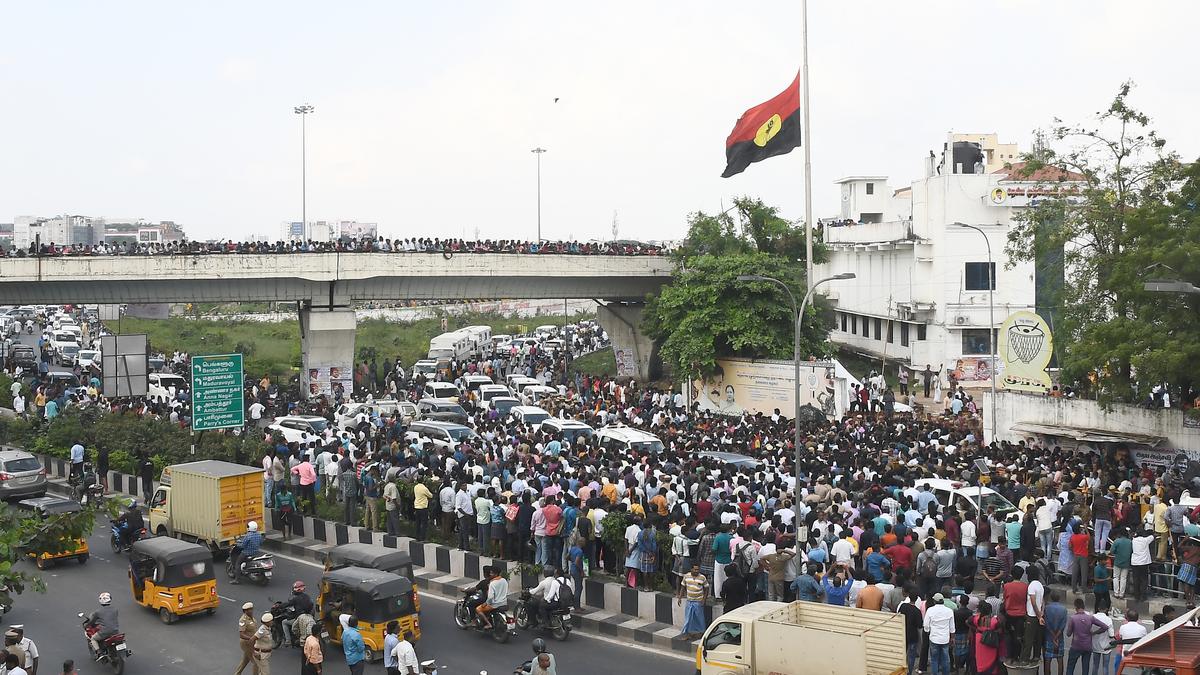
The actor-politician who was more than just hope for his ardent followers
The Hindu
People mourned the death of Narayanan Vijayaraj Alagarswami, a man who overcame adversity to achieve success and inspire hope.
The unlikely and extraordinary success of Narayanan Vijayaraj Alagarswami and the way it overwhelmed the world around him was apparent on the day he died. In the morning, when Vijayakant, as his later, more successful avatar was called, died, even before the official news was out, people were wailing and keening, some dropping on the road, choking the streets of Saligramam and Koyambedu with grief. What did they see in this man, eclipsed many moons ago by a sequelae of health issues, rendering him enfeebled, and enervated in public appearances, ironically nearly comical, like a parody of the best version of himself. In him, they saw extreme kindness, generosity, a man who gave to all who sought his help. But, most of all, they saw in him the possibility of hope being realised, the ability of a dream to come true.
Historically, any film industry is ripe with instances of elevating people from nothing to dizzying heights of fame. You could say that Vijayakant was one of them. But then, you would be missing a huge chunk of the story, the real hard work and everyday magic behind the searing rise from the lowest of rungs one could possibly grasp on to, before failing, falling. When he arrived in Chennai, loaded only with dreams and his shirt on his back, with little education, skinny, and darker than those who aspired to make it big in the films, it was a challenge thrown to the entire pantheon of gods. Would this man, so not in the mould, make something of himself after all? Because if he did, then, it allowed the hollow hope enriched by achievement to continue to inspire others. Rise, he did. And how, when it finally happened. It was true that Rajinikanth had broken the mould of the stereotypically fair hero, creating some space for other tropes there. Vijayakant, also, much like his predecessor, moved from villain to hero, his dark visage, and charming smile, rustic quirks aiding him to take every step ahead. Music by Ilaiyaraaja has sculpted many heroes in Tamil Nadu, and Vijayakant is prime among them.
A career then was fashioned, spiced with reluctant romances you desperately hoped would succeed (Amman Koil Kizhakale), stylish action with the eponymous Captain Prabhakaran, risky stunts as in Sethupathi IPS, stories that drew you in such as Vaidehi Kathirunthal, sometimes a touch of pathos, then crusaders (Ramana) and cops (Pulan Visaranai) as the actor star matured to use the medium as his message. He picked a reformist agenda, like former Chief Minister M.G. Ramachandran did, crafting an on-screen presence that would pave his path to a political rise.
Simultaneously his reputation of being a generous man grew within and outside the film industry. Like MGR, he would insist on ensuring every one around him did not lack food. He also tirelessly helped those around him, not stinting to pay the fees of school children, or sparing some lakhs for someone’s surgery. All you had to do was ask ‘Captain’. Sometimes you did not even have to ask him, if Vijayakant had heard of your travails, it was quite likely he would volunteer assistance, all the while, making sure to keep it behind the limelight. The stories slipped out though, as they usually do, suffusing the aura around the Captain, making him a much-loved legend.
It was with the same flamboyance, as we saw in his films, that he launched himself into politics. By all respects, a tougher-to-please master than films, politics somehow made exception for Vijayakant, probably counting in his initial years of struggle in the film industry. How else would a fledgling party built from scratch just a year ago garner over 8% of the votes polled in 2006 and go on to improve on that achievement in the 2009 general election?
Here was a formula for success then, one that was seen to work. A Vijayakant had broken the mould for them; if this boy-next-door, amid great adversity, could scale that formidable wall, and hoist a flag at the summit, maybe they could too. He was their proof of more than just hope, he was the proof they could too.











